As China ages rapidly, who will care for its 400 million seniors by 2040?
More than a fifth of Chinese people are now aged 60 and over. With more families feeling the strains of caregiving, the programme Insight looks at some of the challenges China faces in meeting the needs of its greying population.
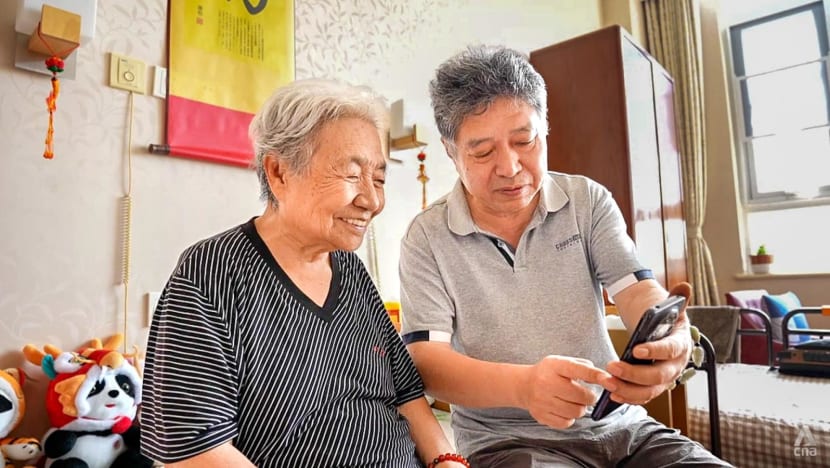
Li Xiangkai showing his mother, Wang Su Qin, videos of his son while visiting her in Changyou Nursing Home.

This audio is generated by an AI tool.
BEIJING: Many of his countrymen might call Li Xiangkai “unfilial” for sending his 85-year-old mother to a nursing home, but he has no regrets.
“They don’t let the elderly be idle,” he said, citing the staff’s daily activities for their charges, such as singing, dancing and handicrafts.
He and his siblings, on the other hand, struggled to care for her while working full-time after she had sustained a fracture in a fall at home.
Last year, she agreed with their suggestion that she should live in a nursing home, which could provide the kind of specialised care they could not.
“It doesn’t mean you’re filial just by watching over her every day. You must give her a very good environment so that she can be happy,” Li said. “This is also fulfilling our filial piety.”
WATCH: ‘It’s okay to send Mum to a nursing home’ — China’s changing face of filial piety (6:05)
But his mother is among the minority who are thriving in China’s eldercare sector, which faces a shortage of trained staff and affordable care options.
Private facilities like the one she is in are expensive, while more affordable public ones have months-long waiting lists. One of Beijing’s most popular homes, for instance, has 1,100 beds and 10,000 people on the waiting list.
In rural areas, the situation is even more dire. According to Xinhua news agency, there are only 1.7 million beds for more than 100 million rural elderly people.
Given public concerns over the affordability and quality of elderly care, plus traditional notions of filial piety, it is little wonder that most Chinese adult children still insist on caring for their parents themselves despite the strain on their well-being.
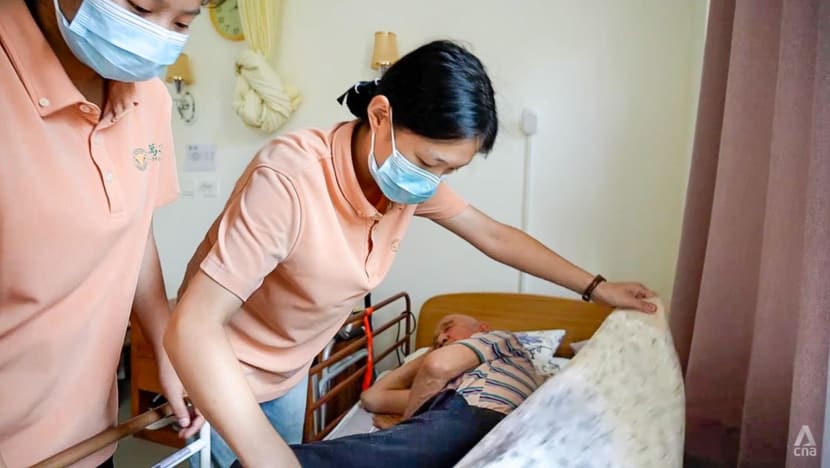
But as smaller households — the result of China’s one-child policy — struggle to care for the old amid a slowing economy, the country is racing to ease their burden and ensure basic eldercare services for all.
People aged 60 and over in China numbered 297 million by the end of last year, forming more than a fifth of the population. Their numbers are set to rise to 402 million by 2040.
The programme Insight looks at some of the challenges faced and solutions pursued to meet the needs of this greying population.
THE ‘9073’ MODEL, AND THE STIGMA KEEPING IT GOING
Roughly 90 per cent of China’s elderly are cared for by their families, 7 per cent receive community care and 3 per cent are in nursing homes, according to the National Health Commission.
WATCH: China’s nursing home stigma — Who will care for the elderly? (46:35)
This is commonly described as the “9073” model, which experts say is increasingly unsustainable. The one-child policy from 1980 to 2015 has resulted in families where only children are expected to care for not only two parents but four grandparents.
This places “significant strain” on a shrinking workforce that must double up as taxpayers and carers of elderly dependents, said senior research fellow Zhao Litao at the National University of Singapore’s East �鶹��ýn Institute.
So far, China isn’t well prepared for the rapidly ageing population.”
While there were five working-age adults to support every retiree in 2021, this ratio is set to drop to two or less by 2050.
“This is why we need to shift the responsibility of (full-time) elderly care … to the society,” said Wu Yushao, the president of the China Association of Social Welfare and Senior Services.
“With single-child families, … it’s impossible for them to use the model of the past, whereby the child takes care of the parents.”
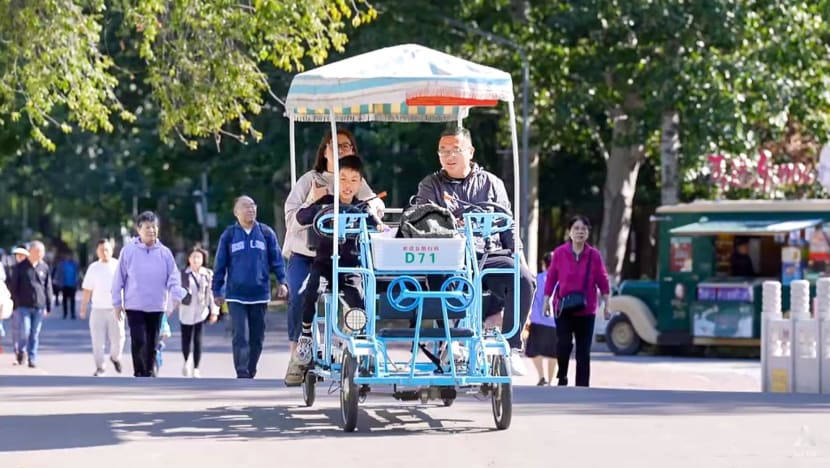
But experts also say China has a long way to go before people are ready to embrace other forms of elderly care.
Nursing homes, for example, are seen as a last resort for seniors who are childless or lack the ability to live independently — or as a dumping ground for those unlucky enough to have unfilial offspring.
In one 2020 study by Harbin Medical University, elderly Chinese with children were seven and a half times less willing than those without children to live in care facilities.
The stigma is such that after Shanghai’s government announced plans to build 200 nursing homes by 2020, residents near the proposed sites protested, fearing the homes would affect property prices or bring bad luck.
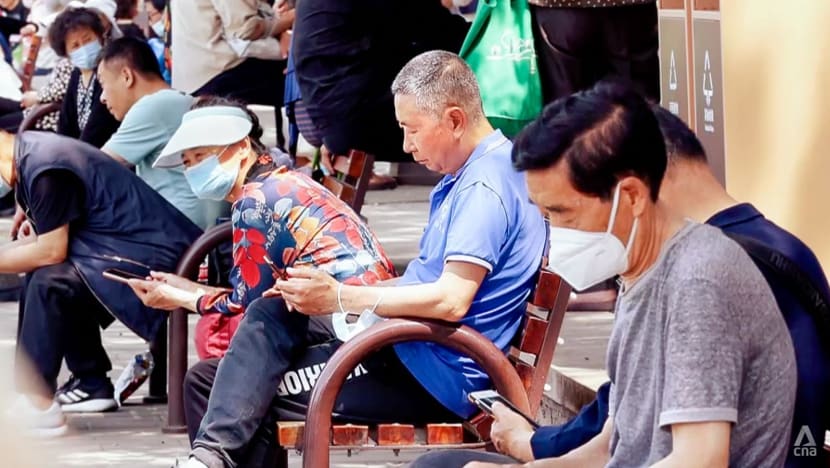
Many people still see nursing homes as “places where people wait to die”, said Feng Sheng, the president of Changyou Elderly Care Service Group.
The dearth of trained staff in many homes remains a source of anxiety for families, who fear their ageing parents could potentially face mistreatment from overworked care workers.
The situation is worse for nursing homes in rural areas, where standards “are indeed not very good and quite basic”, said Wu.
Most rural seniors must fend for themselves, as their children have typically migrated to cities to find better-paying work. And the attitude of self-reliance among rural folk could contribute towards their resistance to care facilities.
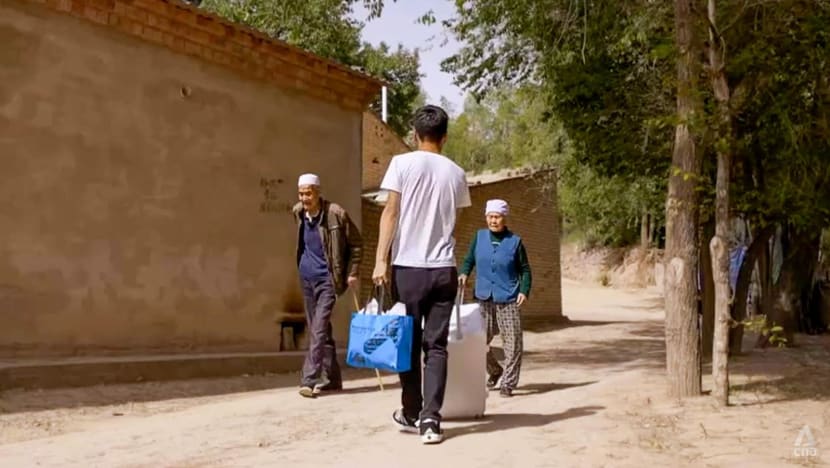
A NEED FOR MORE RESOURCES
In the cities, there are Chinese who are more willing to go into a nursing home. Huang Tian Hui, a bachelor and bar owner in Shanghai, intends to do so once he gets too old to care for himself.
Some of his friends have even suggested checking into the same home so they can “grow old together”, said the 62-year-old, who called it a “pretty good” idea.
Similarly, Li shared that he and his wife have discussed the possibility of living in a good care facility like Changyou’s in their twilight years so that they “won’t cause trouble” for their children.
For others like them, securing a place in a suitable facility is the main difficulty, owing to the cost or oversubscription.
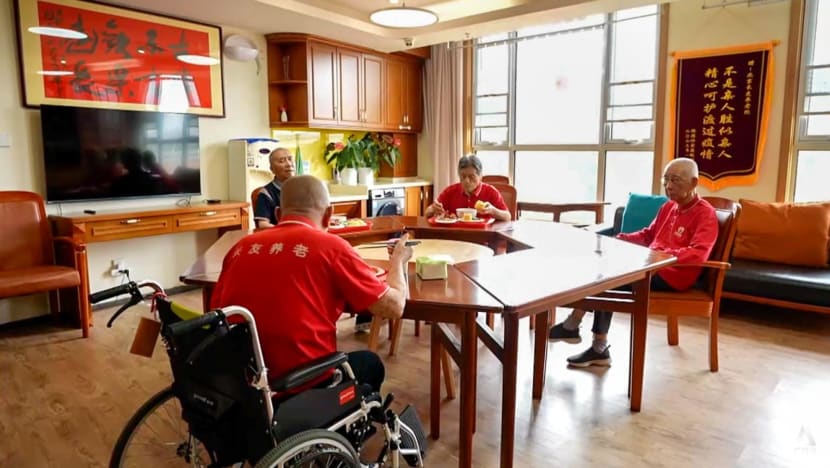
A bed in a public nursing home can range from around 1,000 to 3,000 yuan (S$180 to S$550) a month, and admission is generally prioritised according to the help needed with daily living activities.
In a private nursing home such as Changyou, a shared room with two beds costs 4,400 yuan a month, and a private room costs double that. The average monthly salary in Beijing, where Changyou is located, is around 13,000 yuan.
In megacities such as Shanghai and Beijing, the cost of living in a private nursing home can go up to 19,000 yuan a month, with a requirement that at least a one-year lease be signed.
Eldercare costs aside, the sector is struggling to attract more workers. According to the China Research Centre on Ageing, the country currently has about 500,000 eldercare workers but requires 12 times that number.
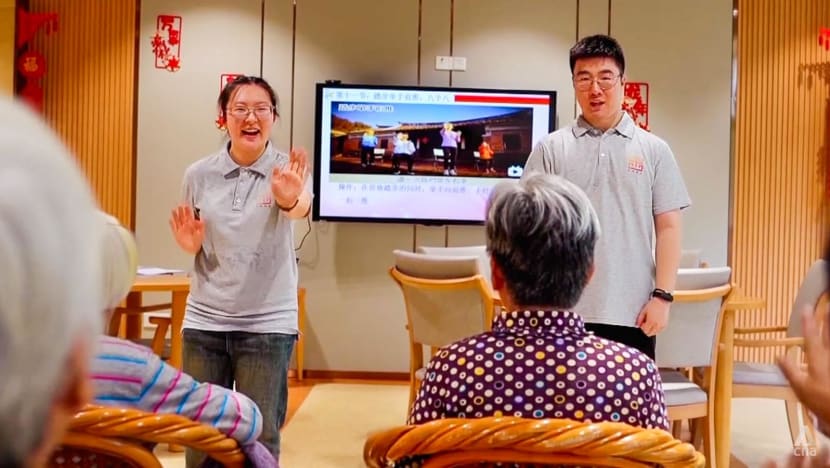
In Beijing, the local government awards up to 60,000 yuan to those who enter the industry. But money alone may not be enough to entice young Chinese put off by the hard work and stigma attached to elderly care.
Shanghai Mental Health Centre president Xie Bin also highlighted the need for more medical services for the elderly, who typically present with more cognitive disorders than the young, including depression and anxiety.
This is compounded by a lack of healthcare staff. China has 2.4 doctors per 1,000 people, compared to an average of 3.7 in the Organisation for Economic Co-operation and Development, which comprises mostly affluent countries.
China also has about four nurses per 1,000 people, compared with 8.8 per 1,000 in South Korea and 12.1 in Japan, the world’s fastest-ageing countries.
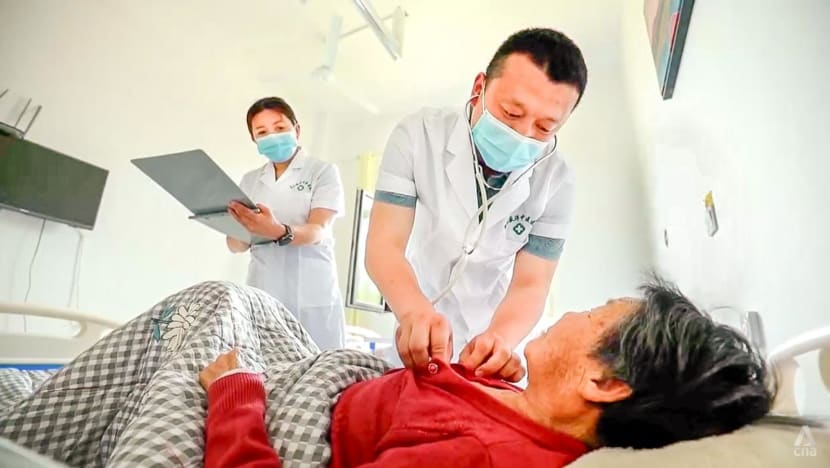
AMID REFORMS, SOCIAL CARE SERVICES FILL THE GAP
With the scale of China’s ageing population, government officials are having to carry out sweeping reforms of, for example, the retirement age, which is among the lowest in the world.
Currently, some 300 million seniors aged 50 to 60 are expected to exit the workforce over the next decade. And by 2035, the nation’s pension system will dry up, the Chinese Academy of Sciences forecasts.
To keep more people in the workforce for longer and ease pension shortfalls, Beijing is raising the retirement age from 60 to 63 for men, 55 to 58 for white-collar female workers and 50 to 55 for working-class women.
The changes are set to roll out from January over a 15-year period.
All provinces have also been mandated by the central government to establish basic eldercare services by next year. This includes providing visiting and caring services for the elderly living alone and for families in financial difficulties.
China is projected to spend 2.84 trillion yuan on elderly care by 2035 — close to double the amount in 2020 — including on expanding retirement facilities, recruiting more staff and tapping technology to ease its manpower crunch.
Recognising that most elderly Chinese prefer to live in their own homes rather than in nursing care facilities, the government also has a programme in its current five-year plan to enhance home- and community-based eldercare services.
For 79-year-old Heng Shuhua, supported living is the answer to her ageing needs. She lives on her own in Beijing’s Haidian district, with community care facilities and a park located nearby.
Using her wheelchair, she can visit the doctor, the dentist and a pharmacy in 30 minutes, then see her husband, who requires more specialised nursing care, in United Home — next door to her apartment block.
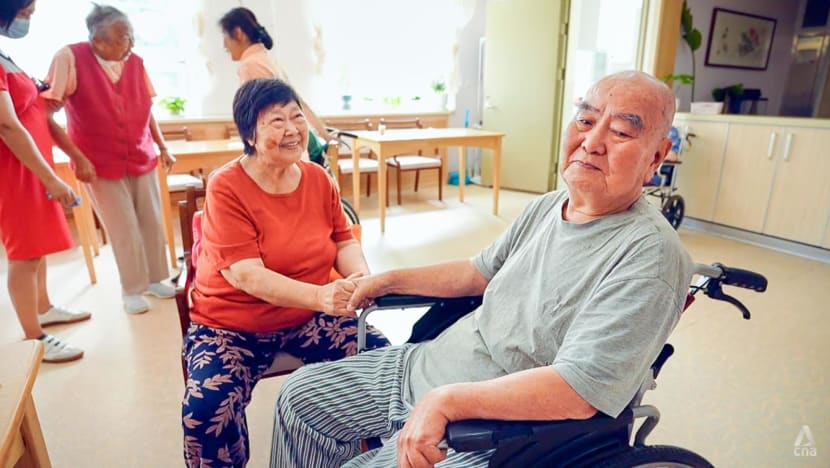
She has regular visits from care workers. And if she has an emergency, help is a phone call away. “I don’t feel lonely too much because I have many good friends in this building,” she added.
With friends and community workers around to check in with elderly people, especially those who live alone, this not only adds a safety net, but also improves their sense of well-being and may help keep chronic health issues at bay.
WHEN LOVE AND FRUSTRATION COLLIDE
While Heng has opted to be in a community with supported living, there are seniors with adult children who have become full-time carers instead.
For 60-year-old Xia Hui, looking after her parents is taking its toll. She quit her small business in February last year and moved back to Shanghai to care for them, while her husband remains in Beijing as the sole breadwinner.
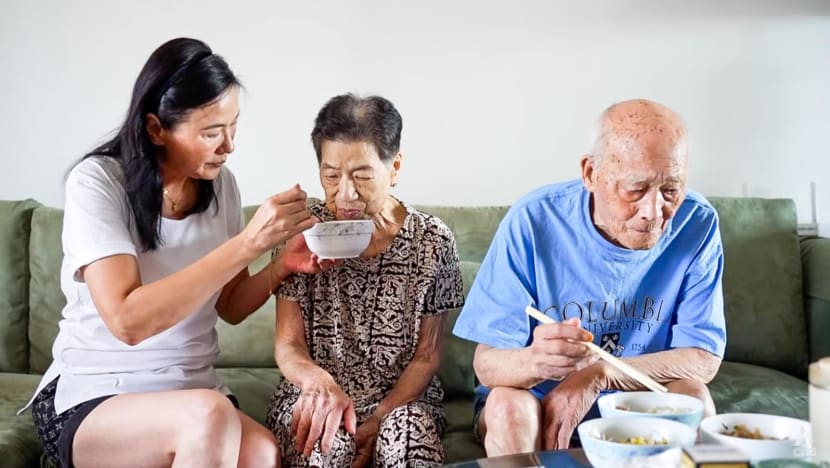
With her 88-year-old mother ailing, Xia can barely meet her friends or indulge in recreational activities to recharge.
“Just two days ago, my friends asked me out to a meal, but I said I didn’t have the time,” she shared. “I really don’t.”
She must also endure her 90-year-old father’s mood swings and constant reprimands for the slightest things. He still thinks of her as a “10-year-old child”, she said.
When frustration boils over, she resorts to a timeless scare tactic “to see his reaction”. “I’ll say, ‘I’ll send you to a nursing home,’” she said. “Then my dad (will be) especially upset.”
At times the thought has indeed crossed her mind. But she still feels reluctant to outsource the care of her parents because of their attitude, particularly her father’s, towards elderly care in the wider community.
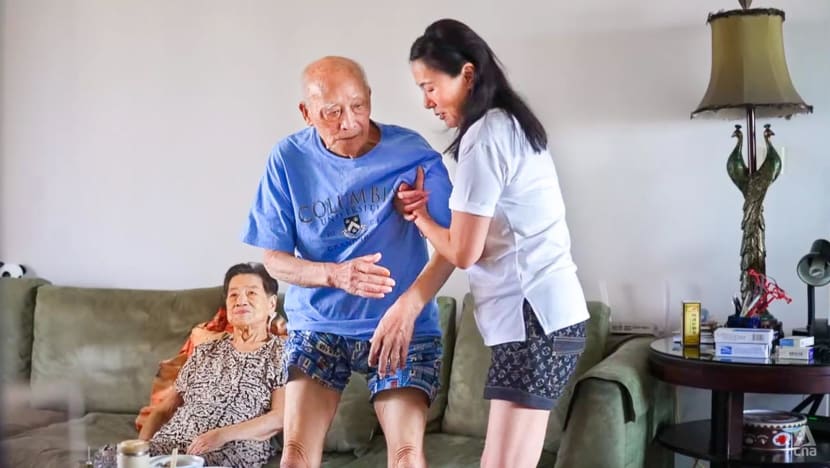
As she spoons more food into her mother’s mouth, then helps her father to his bedroom for his nap, she accepts that this routine will have to be her way of honouring them.
“They raised me, so I’m willing to give my all to support them,” she said. “I’m still willing to have them by my side. Even if they were to pass on at home, I’m willing.”
Watch this episode of . The programme airs on Thursdays at 9 p.m.
















